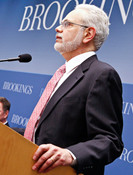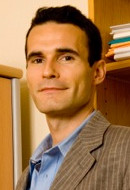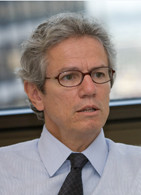
Fifteenth Jacques Polak Annual Research Conference: "Cross-Border Spillovers"
Thursday, November 13, 2014 |
|
| 8:00–8:45 am | Registration and Continental Breakfast |
| 8:45–9:15 am |
Opening Remarks by Olivier Blanchard, Economic Counsellor and Director, Research Department, IMF |
9:15–10:45 am |
SESSION 1: Spillovers from Monetary PolicyChair: José Viñals, Financial Counsellor, Director of the Monetary and Capital Markets Department, IMF ECB Unconventional Monetary Policy Actions: Market Impact, International Spillovers and Transmission Channels Marcel Fratzscher (DIW Berlin, Humboldt-University Berlin), Marco Lo Duca (European Central Bank), and Roland Straub (European Central Bank) Discussant: Lawrence Ball (Johns Hopkins University and IMF) U.S. Monetary Policy and Foreign Bond Yields Simon Gilchrist (Boston University), Vivian Yue (Emory University and Federal Reserve Bank of Atlanta), and Egon Zakrajšek (Federal Reserve Board) Discussant: Jonathan Wright (Johns Hopkins University) |
10:45-11:00 am |
***Coffee Break*** |
11:00–12:30 pm |
SESSION 2: Fiscal SpilloversChair: Vitor Gaspar, Director, Fiscal Affairs Department, IMF Effects of Fiscal Shocks in a Globalized World Alan J. Auerbach (University of California, Berkeley) and Yuriy Gorodnichenko (University of California, Berkeley) Discussant: Christopher Erceg (Federal Reserve Board) Linkages across Sovereign Debt Markets Cristina Arellano (Federal Reserve Bank of Minneapolis) and Yan Bai (University of Rochester) Discussant: Alberto Martin (CREI and IMF) |
12:30–2:00 pm |
***Lunch*** (By invitation only, HQ2, Conference Hall 2) Luncheon Remarks – David Wessel, The Brookings Institution |
2:10–3:40 pm |
SESSION 3: Policy Frameworks to Mitigate SpilloversChair: Changyong Rhee , Director, Asia and Pacific Department, IMF On the Desirability of Capital Controls Jonathan Heathcote (Federal Reserve Bank of Minneapolis) and Fabrizio Perri (Federal Reserve Bank of Minneapolis) Discussant: Markus Brunnermeier (Princeton University) International Spillovers and Guidelines for Policy Cooperation Anton Korinek (Johns Hopkins University) Discussant: Fernando Broner (CREI) |
3:40–4:00 pm |
***Coffee Break*** |
4:00–5:30 pm |
Mundell-Fleming Lecture—Monetary Policy and International Capital Flows Hélène Rey (London School of Economics) Introduction by: Olivier Blanchard, Economic Counsellor and Director, Research Department, IMF |
Friday, November 14, 2014 |
|
| 8:30–9:15 am | Registration and Continental Breakfast |
9:15–10:45 am |
SESSION 4: Real and Financial SpilloversChair: Sharmini Coorey, Director, Institute for Capacity Development, IMF Real and Financial Spillovers in the Eurozone Joseba Martinez (New York University) and Thomas Philippon (New York University) Discussant: Stijn Claessens (IMF) Input Linkages and the Transmission Shocks: Firm-Level Evidence from the 2011 Tōhoku Earthquake Christoph Boehm (University of Michigan), Aaron Flaaen (University of Michigan) and Nitya Pandalai Nayar (University of Michigan) Discussant: Robert Johnson (Dartmouth College) |
10:45-11:00 am |
***Coffee Break*** |
11:00–12:30 pm |
SESSION 5: Management of Capital Flow MeasuresChair: Alejandro Werner, Director, Western Hemisphere Department, IMF Capital Controls in Brazil: Effective? Marcos Chamon (IMF) and Márcio Garcia (PUC-Rio) Discussant: Sebastian Edwards (UCLA) Capital Flow Management when Capital Controls Leak Julien Bengui (Université de Montréal) and Javier Bianchi (University of Wisconsin-Madison) Discussant: Olivier Jeanne (Johns Hopkins University and IMF) |
12:30–2:00 pm |
***Lunch*** (By invitation only, HQ2, Conference Hall 2) |
2:10–3:40 pm |
SESSION 6: Policy Frameworks in Open EconomiesChair: Gian Maria Milesi-Ferretti, Deputy Director, Research Department, IMF Policy Cooperation, Incomplete Markets and Risk Sharing Charles Engel (University of Wisconsin-Madison) Discussant: Linda Tesar (Council of Economic Advisers) The Great Recession: Divide between Integrated and Less Integrated Countries Guillermo Hausmann-Guil (University of Virginia),Eric van Wincoop (University of Virginia), and Gang Zhang (University of Virginia) Discussant: Marianne Baxter (Boston University) |
3:40–3:55 pm |
***Coffee Break*** |
4:00–5:30 pm |
Economic Forum: Cross-Border Spillovers and International Policy CoordinationModerator: Olivier Blanchard, Economic Counsellor and Director, Research Department, IMF Panelists: 1. TBC 2. Jean Boivin (Blackrock) 3. Paulo Nogueira Batista Jr. (IMF) 4. Maurice Obstfeld (Council for Economic Advisors) |
EIN Presswire does not exercise editorial control over third-party content provided, uploaded, published, or distributed by users of EIN Presswire. We are a distributor, not a publisher, of 3rd party content. Such content may contain the views, opinions, statements, offers, and other material of the respective users, suppliers, participants, or authors.

 Olivier Blanchard is the IMF Economic Counsellor and Director, Research Department.
Olivier Blanchard is the IMF Economic Counsellor and Director, Research Department. José Viñals is currently the Financial Counsellor and Director of the Monetary and Capital Markets Department of the International Monetary Fund (IMF). He is a member of the Financial Stability Board, representing the IMF.
José Viñals is currently the Financial Counsellor and Director of the Monetary and Capital Markets Department of the International Monetary Fund (IMF). He is a member of the Financial Stability Board, representing the IMF.  Lawrence Ball is a professor of economics at Johns Hopkins University, where he has served since 1994; a research associate at the National Bureau of Economic Research; and a Visiting Scholar at the International Monetary Fund. He has previously been a Visiting Scholar at a number of central banks, including the Federal Reserve, the Bank of England, the Bank of Japan, and the Reserve Bank of New Zealand.
Lawrence Ball is a professor of economics at Johns Hopkins University, where he has served since 1994; a research associate at the National Bureau of Economic Research; and a Visiting Scholar at the International Monetary Fund. He has previously been a Visiting Scholar at a number of central banks, including the Federal Reserve, the Bank of England, the Bank of Japan, and the Reserve Bank of New Zealand. Marco Lo Duca is currently Principal Financial Stability Expert in the Financial Surveillance Division of the European Central Bank. Marco graduated in 2002 from the Ca’ Foscari University of Venice with a bachelor's degree in financial econometrics. In 2004, he earned a Master Degree cum Laude in Economics and Finance from the International Center of Economics and Finance (ICEF) of the Venice International University (VIU).
Marco joined the European Central Bank in 2004, after briefly working for a consulting firm. He has worked in different business areas at the European Central Bank including Research, Economics, International and European Relations and Financial Stability. Marco has published in academic journals including, among others, the Journal of Monetary Economics, the Journal of Banking and Finance, the International Journal of Central Banking. Marco is also author of a number of articles and working papers in the area of monetary policy spill-overs and the transmission of financial shocks.
Marco Lo Duca is currently Principal Financial Stability Expert in the Financial Surveillance Division of the European Central Bank. Marco graduated in 2002 from the Ca’ Foscari University of Venice with a bachelor's degree in financial econometrics. In 2004, he earned a Master Degree cum Laude in Economics and Finance from the International Center of Economics and Finance (ICEF) of the Venice International University (VIU).
Marco joined the European Central Bank in 2004, after briefly working for a consulting firm. He has worked in different business areas at the European Central Bank including Research, Economics, International and European Relations and Financial Stability. Marco has published in academic journals including, among others, the Journal of Monetary Economics, the Journal of Banking and Finance, the International Journal of Central Banking. Marco is also author of a number of articles and working papers in the area of monetary policy spill-overs and the transmission of financial shocks. Egon Zakrajšek is an Associate Director in the Division of Monetary Affairs, Board of Governors of the Federal Reserve System in Washington, DC.
Egon Zakrajšek is an Associate Director in the Division of Monetary Affairs, Board of Governors of the Federal Reserve System in Washington, DC.  Jonathan Wright is a professor of economics at Johns Hopkins University, specializing in time series econometrics and empirical macroeconomics and finance.
Jonathan Wright is a professor of economics at Johns Hopkins University, specializing in time series econometrics and empirical macroeconomics and finance.  Vitor Gaspar is the Director of Fiscal Affairs Department, IMF.
Vitor Gaspar is the Director of Fiscal Affairs Department, IMF. Yan Bai is Bai is an assistant professor of economics at the University of Rochester.
Yan Bai is Bai is an assistant professor of economics at the University of Rochester. Alberto Martin is a Senior Economist in the IMF’s Research Department on leave from the Centre de Recerca en Economia Internacional (CREI) and the Barcelona Graduate School of Economics, where he respectively serves as a Senior Researcher and a Research Professor.
Alberto Martin is a Senior Economist in the IMF’s Research Department on leave from the Centre de Recerca en Economia Internacional (CREI) and the Barcelona Graduate School of Economics, where he respectively serves as a Senior Researcher and a Research Professor.  David Wessel is director of the Hutchins Center on Fiscal and Monetary Policy, which provides independent, non-partisan analysis of fiscal and monetary policy issues in order to further public understanding and to improve the quality and effectiveness of those policies.
David Wessel is director of the Hutchins Center on Fiscal and Monetary Policy, which provides independent, non-partisan analysis of fiscal and monetary policy issues in order to further public understanding and to improve the quality and effectiveness of those policies. Changyong Rhee is the Director of the IMF Asia and Pacific Department.
Changyong Rhee is the Director of the IMF Asia and Pacific Department. Jonathan Heathcote is a Monetary Advisor in the Research Department of the Federal Reserve Bank of Minneapolis.
Jonathan Heathcote is a Monetary Advisor in the Research Department of the Federal Reserve Bank of Minneapolis.  Markus Brunnermeier is the Edwards S. Sanford Professor at Princeton University. He is a faculty member of the Department of Economics and director of Princeton's Bendheim Center for Finance. He is the founding and former director of Princeton’s Julis Rabinowitz Center for Public Policy and Finance and affiliated with the International Economics Section. He is also a research associate at NBER, CEPR, and CESifo. He is a member of several advisory groups, including to the IMF, the New York Federal Reserve, the European Systemic Risk Board, and the Bundesbank. Brunnermeier was awarded his Ph.D. by the London School of Economics (LSE).
Markus Brunnermeier is the Edwards S. Sanford Professor at Princeton University. He is a faculty member of the Department of Economics and director of Princeton's Bendheim Center for Finance. He is the founding and former director of Princeton’s Julis Rabinowitz Center for Public Policy and Finance and affiliated with the International Economics Section. He is also a research associate at NBER, CEPR, and CESifo. He is a member of several advisory groups, including to the IMF, the New York Federal Reserve, the European Systemic Risk Board, and the Bundesbank. Brunnermeier was awarded his Ph.D. by the London School of Economics (LSE). Anton Korinek is a faculty member at the Department of Economics at Johns Hopkins University and a Faculty Research Fellow at the NBER.
Anton Korinek is a faculty member at the Department of Economics at Johns Hopkins University and a Faculty Research Fellow at the NBER. Hélène Rey is Professor of Economics at London Business School.
Hélène Rey is Professor of Economics at London Business School. Sharmini Coorey is the Director of the IMF Institute for Capacity Development.
Sharmini Coorey is the Director of the IMF Institute for Capacity Development. Thomas Philippon is Professor of Finance at New York University - Stern School of Business.
Thomas Philippon is Professor of Finance at New York University - Stern School of Business. Stijn Claessens is Assistant Director in the Research Department of the International Monetary Fund.
Stijn Claessens is Assistant Director in the Research Department of the International Monetary Fund. Aaron Flaaen is a Ph.D. candidate in economics at the University of Michigan with interests in international trade, multinational firm behavior, and macroeconomics.
Aaron Flaaen is a Ph.D. candidate in economics at the University of Michigan with interests in international trade, multinational firm behavior, and macroeconomics. Alejandro Werner is the Director of the IMF Western Hemisphere Department.
Alejandro Werner is the Director of the IMF Western Hemisphere Department. Márcio Garcia is associate professor at PUC-Rio, Brazil, since 1991, having already served as Department Chairman and Director of both Graduate and Undergraduate Studies.
He holds a Ph.D. from Stanford University Economics Department.
His areas of research are International Finance and Monetary Economics. Marcio has been visiting professor/scholar at the economics departments of Stanford, Chicago, MIT and MIT/Sloan, in the US, and at Paris School of Economics (then, DELTA) and Université D’Evry-Val-D’Essone, in France.
He has consulted for international and Brazilian institutions, as The World Bank, IMF, IADB, ECLAC/UN, BM&F Bovespa, BNDES, Icatu, ANBID, NEO Investimentos, and others. His academic
Márcio Garcia is associate professor at PUC-Rio, Brazil, since 1991, having already served as Department Chairman and Director of both Graduate and Undergraduate Studies.
He holds a Ph.D. from Stanford University Economics Department.
His areas of research are International Finance and Monetary Economics. Marcio has been visiting professor/scholar at the economics departments of Stanford, Chicago, MIT and MIT/Sloan, in the US, and at Paris School of Economics (then, DELTA) and Université D’Evry-Val-D’Essone, in France.
He has consulted for international and Brazilian institutions, as The World Bank, IMF, IADB, ECLAC/UN, BM&F Bovespa, BNDES, Icatu, ANBID, NEO Investimentos, and others. His academic  Sebastian Edwards is the Henry Ford II Professor of International Economics at the University of California, Los Angeles. He is the Co-Director of the National Bureau of Economic Research's "Africa Project" and previously served as the Chief Economist for Latin America at the World Bank. His research interests include emerging markets, currency crises, capital markets, Latin America, monetary policy, and the Federal Reserve.
In 2004, he delivered the Mundell Fleming Lecture.
Sebastian Edwards is the Henry Ford II Professor of International Economics at the University of California, Los Angeles. He is the Co-Director of the National Bureau of Economic Research's "Africa Project" and previously served as the Chief Economist for Latin America at the World Bank. His research interests include emerging markets, currency crises, capital markets, Latin America, monetary policy, and the Federal Reserve.
In 2004, he delivered the Mundell Fleming Lecture. Olivier Jeanne is a Professor of Economics at Johns Hopkins University, which he joined in 2008 after ten years at the Research Department of the International Monetary Fund. His research spans an array of applied and theoretical topics in international and domestic macroeconomics: capital flows, exchange rate regimes and currency crises, sovereign debt and defaults, international liquidity, and monetary policy. Olivier Jeanne is a Senior Fellow at the Peterson Institute for International Economics (Washinton DC), a Research Associate at the National Bureau of Economic Research (NBER), and a Research Fellow at the Center for Economic Policy Research (CEPR).
He graduated from Ecole Polytechnique and Ecole Nationale des Ponts et Chaussees in France, holds a MsC in Economics from the London School of Economics and a PhD in Economics from Ecole des Hautes Etudes en Sciences Sociales (EHESS, Paris). Before joining Johns Hopkins University he taught economics at Ecole Polytechnique, UC Berkeley and Princeton University. In 2014-15 he is on leave as a Resident Scholar at the Research Department of the IMF.
Olivier Jeanne is a Professor of Economics at Johns Hopkins University, which he joined in 2008 after ten years at the Research Department of the International Monetary Fund. His research spans an array of applied and theoretical topics in international and domestic macroeconomics: capital flows, exchange rate regimes and currency crises, sovereign debt and defaults, international liquidity, and monetary policy. Olivier Jeanne is a Senior Fellow at the Peterson Institute for International Economics (Washinton DC), a Research Associate at the National Bureau of Economic Research (NBER), and a Research Fellow at the Center for Economic Policy Research (CEPR).
He graduated from Ecole Polytechnique and Ecole Nationale des Ponts et Chaussees in France, holds a MsC in Economics from the London School of Economics and a PhD in Economics from Ecole des Hautes Etudes en Sciences Sociales (EHESS, Paris). Before joining Johns Hopkins University he taught economics at Ecole Polytechnique, UC Berkeley and Princeton University. In 2014-15 he is on leave as a Resident Scholar at the Research Department of the IMF. Charles Engel is a professor of economics at the University of Wisconsin, where he moved in 2000. He has previously held positions at the University of Virginia and the University of Washington. He has been an editor of the Journal of International Economics since 2001.
Charles Engel is a professor of economics at the University of Wisconsin, where he moved in 2000. He has previously held positions at the University of Virginia and the University of Washington. He has been an editor of the Journal of International Economics since 2001. Linda Tesar is currently on leave from the University of Michigan and is serving as the senior macroeconomist at the Council of Economic Advisers in the Executive Office of the President. She received her Ph.D. from the University of Rochester in 1990 and spend seven years on the faculty at the University of California at Santa Barbara. She joined the faculty at Michigan in 1997 and served as Department Chair from 2007 to 2011.
Professor Tesar is a Research Associate at the National Bureau of Economic Research and has been a visitor in the research departments at the IMF, the Board of Governors, the Federal Reserve Bank of Minneapolis and the Paris School of Economics. Professor Tesar’s research focuses on issues in international finance, with particular interests in the international transmission of business cycles and fiscal policy, the impact of capital market integration, the effects of exchange rate exposure, international tax competition and the European debt crisis. Results of her research have been published in the American Economic Review, the American Economic Journal: Macroeconomics, the Journal of International Economics, the Journal of Monetary Economics, the Review of Financial Studies and other academic journals.
Linda Tesar is currently on leave from the University of Michigan and is serving as the senior macroeconomist at the Council of Economic Advisers in the Executive Office of the President. She received her Ph.D. from the University of Rochester in 1990 and spend seven years on the faculty at the University of California at Santa Barbara. She joined the faculty at Michigan in 1997 and served as Department Chair from 2007 to 2011.
Professor Tesar is a Research Associate at the National Bureau of Economic Research and has been a visitor in the research departments at the IMF, the Board of Governors, the Federal Reserve Bank of Minneapolis and the Paris School of Economics. Professor Tesar’s research focuses on issues in international finance, with particular interests in the international transmission of business cycles and fiscal policy, the impact of capital market integration, the effects of exchange rate exposure, international tax competition and the European debt crisis. Results of her research have been published in the American Economic Review, the American Economic Journal: Macroeconomics, the Journal of International Economics, the Journal of Monetary Economics, the Review of Financial Studies and other academic journals. Eric van Wincoo is the Robert P. Black Professor of Economics at the University of Virginia and Research Associate at the National Bureau of Economic Research. He joined the University of Virginia in 2001, following appointments at Boston University (1989-1996) and the Federal Reserve Bank of New York (1996-2001).
He has been a co-editor at the Journal of International Economics since 2004. He received his Ph.D. from Harvard University in 1989. His research is in the area of international macroeconomics on a wide range of topics such as international capital flows, the determination of exchange rates, international risk sharing and international transmission of business cycles.
Eric van Wincoo is the Robert P. Black Professor of Economics at the University of Virginia and Research Associate at the National Bureau of Economic Research. He joined the University of Virginia in 2001, following appointments at Boston University (1989-1996) and the Federal Reserve Bank of New York (1996-2001).
He has been a co-editor at the Journal of International Economics since 2004. He received his Ph.D. from Harvard University in 1989. His research is in the area of international macroeconomics on a wide range of topics such as international capital flows, the determination of exchange rates, international risk sharing and international transmission of business cycles.  Marianne Baxter is a Professor of Economics in the Department of Economics at Boston University. She received her Ph.D. from the University of Chicago in 1984 and began her career at the University of California at Santa Barbara. Subsequently, she held faculty positions at the University of Rochester and the University of Virginia before joining the faculty of Boston University in 2000.
Marianne Baxter is a Professor of Economics in the Department of Economics at Boston University. She received her Ph.D. from the University of Chicago in 1984 and began her career at the University of California at Santa Barbara. Subsequently, she held faculty positions at the University of Rochester and the University of Virginia before joining the faculty of Boston University in 2000. Mr. Paulo Nogueira Batista, Jr. is a well-known Brazilian economist. Since April 2007, Mr. Nogueira Batista has been Executive Director at the IMF. He represents Brazil, Cape Verde, the Dominican Republic, Ecuador, Guyana, Haiti, Nicaragua, Panama, Suriname, Timor Leste and Trinidad and Tobago.
Mr. Paulo Nogueira Batista, Jr. is a well-known Brazilian economist. Since April 2007, Mr. Nogueira Batista has been Executive Director at the IMF. He represents Brazil, Cape Verde, the Dominican Republic, Ecuador, Guyana, Haiti, Nicaragua, Panama, Suriname, Timor Leste and Trinidad and Tobago. Mr. Maurice Obstfeld is a member of the Council of Economic Advisers. He is on leave from the University of California, Berkeley, where he is the Class of 1958 Professor of Economics. He joined Berkeley in 1989 as a professor, following appointments at Columbia (1979-1986) and the University of Pennsylvania (1986-1989). He received his Ph.D. in economics from MIT in 1979.
Mr. Maurice Obstfeld is a member of the Council of Economic Advisers. He is on leave from the University of California, Berkeley, where he is the Class of 1958 Professor of Economics. He joined Berkeley in 1989 as a professor, following appointments at Columbia (1979-1986) and the University of Pennsylvania (1986-1989). He received his Ph.D. in economics from MIT in 1979.